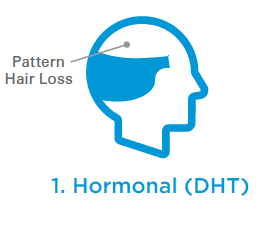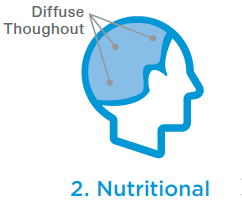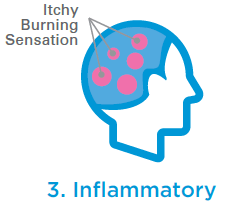The reason that most people fail at fully treating their hair loss is due to not blocking ALL 3 reasons for loss.
Hair loss is a natural part of life and only needs to be addressed once symptoms such as excessive thinning or balding become apparent.
Although the most common cause of hair loss is due to genetics, certain factors, such as hormones or environmental and lifestyle elements, can act as accelerators and stimulate hair loss at a faster pace.
It is common for people who are losing hair to suffer from more than one of the three reasons behind hair loss. Because of this, it is important to know that until ALL OF THE REASONS are understood and blocked, hair will not be able to grow back naturally. This philosophy of treating the 3 reasons for hair loss is known as the Gaunitz Trichology Method (GTM).
GTM says that there are only 3 reasons for hair loss. Although there are many types of hair loss, all types and reasons can be categorized in the three groups. Each group has its own set of treatments and once all three types of hair loss mitigated, all recoverable hair follicles will reverse the hair loss process and regrow to their fullest potential at that time.

Hormones are important chemical messengers that travel through the bloodstream. An imbalance in testosterone levels for men, and an imbalance in estrogen and progesterone levels for women, can seriously affect hair loss.
In both cases, the primary issue is a person’s genetic sensitivity to di-hydro-testosterone (DHT), which is an active form of testosterone that can be found in both men and women. When is DHT is the cause of hair loss, this is known as androgenetic alopecia.
Hormonal hair loss in men, or male pattern hair loss, is related to a genetic sensitivity the hair follicles of the scalp to DHT. This can happen at any point in time after puberty and is usually more dramatic than female pattern loss because of the hormonal difference between men and women.
For women, female pattern/hormonal hair loss is influenced by additional factors including estrogen and progesterone levels. These levels start to increase during puberty and peak around the age of 35-year-old. After this peak when these two hormones begin to decline, DHT becomes more capable of negatively influencing the hair follicles and androgenetic hair loss can begin.
In either sex, it can take several years before the impact of hormonal hair loss becomes noticeable. This is usually a gradual process that only occurs on the top of the scalp (temples, crown, vertex).

Another reason for experiencing hair loss is a lack of appropriate nutritional intake. This can occur when the body is deficient on vitamins and minerals and is not in proper condition to maintain a healthy scalp.
The two most important nutrients needed for proper hair growth are Vitamin D3 and Ferritin.
While Vitamin D3 boosts the immune system and helps to create new hair follicles, Ferritin is a protein that stores iron, which carries oxygen to our cells and stimulates hair growth.
Knowing your blood type is also important in avoiding nutritional hair loss, as each blood type carries specific nutritional requirements that are body cannot do without.
This type of hair loss is diffused throughout the entire scalp and strongly impacts all those already suffering from Hormonal hair loss.
DHT-related hair loss can in fact substantially worsen, or result untreatable, if the client/patient is also suffering from nutritional deficiencies which have not been properly addressed.

The third and final reason for hair loss is related to the presence of inflammation in the body and in the scalp.
Stress, for example, not only impacts us on an emotional level but on a physical one too. By creating excessive inflammation in the body, hair loss can occur and as well as a general weakening of the immune system.
Inflammation can manifest itself through in many ways including scalp itching and burning, as well as through digestive issues such as constipation, diarrhea, or acid reflux. Often times inflammation can result in conditions such as folliculitis, telogen effluvium, seborrheic dermatitis, psoriasis, and scaring alopecias.
Inflammatory hair loss may be caused by additional lifestyle factors such as extreme exercising, medications, lack of sleep or alcohol, and drug abuse.



